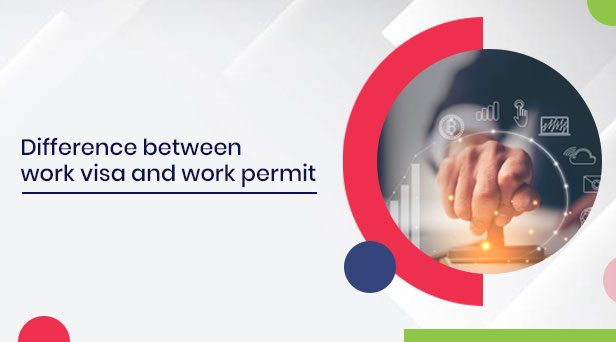Many individuals often conflate work visas and work permits when considering opportunities to work abroad. While both options provide authorization to work in a foreign country, they differ significantly in terms of eligibility criteria, application processes, and duration of validity. Understanding the nuances between work visas and work permits is crucial for individuals seeking employment opportunities abroad.
What is a work visa and a work permit?
A work visa is typically issued to individuals who have secured a job offer from a foreign employer and meet specific eligibility requirements set by the host country. The application process for a work visa can be complex and time-consuming, requiring documentation such as a job contract, proof of qualifications, and financial stability. Work visas are usually granted for a predetermined period, allowing individuals to work legally in the host country during that time.
On the other hand, a work permit is a document that authorizes an individual to work in a foreign country for a specific employer and job role. Unlike a work visa, a work permit is tied to a particular job and employer, limiting the individual's ability to change employment without obtaining a new permit. Work permits are typically easier to obtain than work visas and are often granted for shorter durations, depending on the specific requirements of the host country.
What is the difference between the two?
One key distinction between work visas and work permits is their impact on an individual's ability to stay and work in a foreign country long-term. Work visas are often seen as a pathway to permanent residency or citizenship, as they provide a broader scope of employment opportunities and potential for long-term stay. In contrast, work permits are more restrictive in terms of job mobility and may not lead to a permanent residency status in the host country.
When deciding between a work visa and a work permit, individuals should consider their long-term career goals, the job market in the host country, and the legal implications of each option. Seeking advice from immigration consultants or legal experts can provide valuable insights into the potential advantages and limitations of both work visas and work permits.
When comparing work visas and work permits, it's essential to consider the potential advantages and limitations of each option. Here are some key factors to keep in mind:
Advantages and limitations
Advantages of work visas:
-
Pathway to Permanent Residency: Work visas often serve as a stepping stone towards permanent residency or citizenship in the host country, providing individuals with the opportunity to establish long-term roots.
-
Job Mobility: Work visas allow individuals to explore a wider range of employment opportunities and change jobs within the same country without needing to obtain a new visa.
-
Longer Validity Period: Work visas typically have longer validity periods compared to work permits, which can provide more stability and security for individuals working abroad.
Limitations of work visas:
-
Stringent Eligibility Criteria: Work visas often have strict eligibility requirements, including proof of qualifications, job offers from recognized employers, and financial stability, making them challenging to obtain.
-
Complex Application Process: The application process for work visas can be time-consuming and bureaucratic, requiring extensive documentation and potential interviews.
-
Limited Job Flexibility: Work visas may restrict individuals to specific industries or job roles, limiting their job mobility and flexibility in the host country.
Advantages of work permits:
-
Easier to Obtain: Work permits are generally easier to obtain than work visas, as they are tied to specific job roles and employers.
-
Quicker Processing Time: Work permits often have shorter processing times compared to work visas, allowing individuals to start working sooner in the host country.
-
Employer-Sponsored: Work permits are typically sponsored by the employer, simplifying the application process for individuals seeking employment with a specific company.
Limitations of work permits:
-
Limited Job Mobility: Work permits are tied to specific employers and job roles, making it challenging for individuals to change jobs without obtaining a new permit.
-
Shorter Validity Period: Work permits are often granted for shorter durations than work visas, requiring individuals to renew their permits more frequently.
-
No Pathway to Permanent Residency: Work permits may not lead to permanent residency or citizenship in the host country, limiting long-term prospects for individuals seeking to settle abroad.
Eligibility requirements
Eligibility requirements for obtaining a work visa or work permit vary depending on the host country's regulations and immigration policies. In general, common eligibility criteria may include:
-
Job Offer: Individuals must have a valid job offer from a recognized employer in the host country.
-
Qualifications: Individuals must possess the necessary qualifications, skills, or experience required for the job role.
-
Health and Security Checks: Individuals may be required to undergo medical examinations and security checks to ensure they meet health and safety standards.
-
Financial Stability: Individuals may need to demonstrate sufficient funds to support themselves during their stay in the host country.
-
Language Proficiency: Depending on the job requirements, individuals may need to demonstrate proficiency in the host country's official language.
In conclusion, work visas and work permits play a crucial role in facilitating employment opportunities for individuals seeking to work abroad. By understanding the differences between these two options and considering their implications, individuals can make informed decisions that align with their career aspirations and personal circumstances. Ultimately, navigating the complexities of obtaining authorization to work abroad requires careful planning, research, and professional guidance to ensure a successful and rewarding experience in a foreign country.












